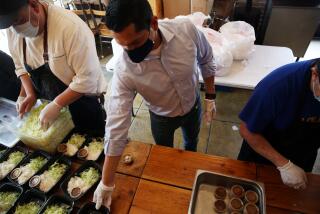The Hungry Have Many Faces in Yankee New Hampshire
- Share via
ALSTEAD, N.H. — Stella French is a scavenger of sorts.
She’s often just one meal away from going hungry. After paying her rent, French, 90, has less than $150 a month left for bills and food.
So, like thousands of other New Hampshire residents, she spends much of her time searching for food from the patchwork of social service agencies that offer free or inexpensive meals.
Ask French what she does on any given day, and she will answer with where she will be eating.
“Monday we go up to the church for dinner,” she said recently while eating lunch courtesy of a program at the Alstead Fire Department. “Tuesdays we come here for lunch and I take home two lunches.
“Now, Wednesday I’ll go up to Bellows Falls [Vt.] . . . and have lunch there. Thursdays we will come back here. Right now Friday is the day we dig out the Meals on Wheels, and there’s nothing doing on Saturday and Sunday.”
For an increasing number of New Hampshire’s 1.2-million residents, there is nothing doing. Most of them are not welfare mothers or homeless men. The reasons for their hunger are as varied as their faces.
“It’s not a state where people are dropping dead on the street because they’re starving, but they’re poorly nourished because they can’t afford to eat right,” said Albert Tremblay, director of the New Hampshire Food Bank.
Census figures show the state has the nation’s lowest poverty rate and second-lowest proportion of residents (12.1%) on public assistance. Nevada is lowest, with 11.9%.
According to the U.S. Department of Agriculture’s most recent statistics, more than 8% of New Hampshire households weren’t sure where their next meal was coming from in 1998, up from just over 6% the year before. And more than 3% of the state’s households faced actual hunger in 1998, up from 2% in 1997.
Business at the food bank increased roughly 50% during the last five years, an increase Tremblay attributes to more working single parents struggling to feed their children.
“There are very few people on welfare going to pantries,” he said. “It’s the single parent who has to maintain a home, provide medical care and everything else. They just don’t have the money.”
That means children go hungry.
For most children, summer is a time to celebrate. But summer can be tough for the 28,000 New Hampshire children who get free lunches at school the rest of the year.
When school lets out, “our distribution goes sky high,” Tremblay said. “Kids really have to fend for themselves. They’ll have a candy bar, or they won’t eat at all.”
A federal program that depends on volunteer administrators provides lunches during summer vacation. But Elaine Van Dyke, administrator for the state Bureau of Nutrition, said the program doesn’t come close to meeting the need. Only 3,300 children received meals last summer.
“We don’t have as many sponsorships as there are hungry children, so they do go hungry,” she said.
Those at the other end of the age spectrum don’t fare much better, any time of the year. Of the nearly 148,000 New Hampshire residents over age 65, nearly 12,000 live in poverty. That means their annual income is no more than $8,259.
Few are as open about their situation as French, who accepts the generosity of a friend who shuttles her from place to place for meals. Most are ashamed of needing help and would rather do without.
Mary Lou Huffling, director of Fall Mountain Friendly Meals in Alstead, blames what she calls a Yankee sense of independence.
“For the elderly, it’s a generation thing,” she said. “They will pay their bills before they eat. Some of them are eligible for services, like food stamps [or] help on their electric bills. But they absolutely won’t apply for it. To admit they need help and get into public assistance at all is the most degrading thing.”
Between young and old are the working poor, men and women who toil at low-paying jobs, often more than one, and get few or no benefits.
They shared few of the spoils of the good economy in recent years, but now are likely to bear the brunt as it falters.
The state’s low unemployment rate hides the numbers of working poor who make up a significant segment of the population, said Richard Hayes, executive director of Strafford County Community Action in Rochester.
“New Hampshire was highly rated in national polls as having a great quality of life, and that drew huge numbers of people here hoping to find their pots of gold. But that didn’t turn out for them. They ended up working part-time jobs, not getting benefits and health insurance, just getting by,” he said.
The food bank, run by New Hampshire Catholic Charities, serves hundreds of food pantries, soup kitchens, group homes, homes for battered women and orphanages across the state.
Last year, 2.7 million pounds of food moved through its Manchester warehouse. Though it’s impossible to calculate how many people consumed that food, half a pound translates into roughly one meal.
“Even when the economy was very, very good, we had more people in here,” Tremblay said. “We never slowed down. The economy was good, yes, but only for a certain few. There were still lots of people in mediocre jobs.”
Even a mediocre job is hard to come by for those who face another challenge to putting food on the table--transportation. In rural towns where the jobs often are miles away, the absence of public transportation makes working nearly impossible for those who can’t afford cars.
Deborah Walsh, a manager at the Tri-County Community Action Program in Berlin, said people without transportation are trapped in local low-paying jobs. But having transportation doesn’t guarantee more money.
“The other side of the coin is when you travel out of town you probably spend what extra you make on gas because you need to travel so far,” she said.
Bessie Dunham and her adult daughter, Judy Wheeler, know that quandary well. Wheeler, 44, and her two young children live with her 67-year-old mother in Alstead, a town of 1,700 in the southwest corner of the state. They recently moved in together because Wheeler could not find a job she could get to without a car.
For now the four of them live on the older woman’s $685 monthly Social Security check, $360 of which goes for rent. That doesn’t leave much for bills, or food.
“It’s very difficult with just my money coming in once a month,” Dunham said. “Sometimes we don’t [make it]. We usually run out by the end of the month.”
Help, though it can be meager, is available for those who seek it.
Of all the federal programs aimed at alleviating hunger, the biggest is the food stamp program, which provides about $2 a day for the average recipient. Eligibility is based on assets and income.
Dunham and Wheeler get $45 a month in food stamps. It helps, but it’s hardly enough. Why don’t they get more? They were told they make too much money.
The program serves about 16,300 New Hampshire households, or roughly 33,000 people, said Terry Smith, its director. After peaking at 26,000 families in 1994, the numbers have held steady for the last few years, he said.
Ten percent of the recipients work full time. Just under half are under 18, and more than one-third are under 12, he said.
The elderly make up 8% of the total, though many more could apply. According to Smith, just one-quarter of eligible senior citizens get food stamps.
“People are stigmatized, they’re ashamed to come in,” he said. “That’s one thing we have to try to educate people about. Food stamps are about nutrition and health.”
Walsh hopes the public will focus on the number of New Hampshire residents who are frighteningly close to going hungry, often getting by meal to meal. Her agency’s food pantry in Berlin helps roughly 30 families a month, only about a third of the number she estimates need help. Many have jobs, but one illness or unexpected expense can change everything.
“A lot of people have a concept that it’s welfare people in need. That’s just not so. Circumstances or hardships could drive anyone in here,” she said. “Someone could be going along fantastically one day and then just have the rug pulled out from under them.”
More to Read
Sign up for Essential California
The most important California stories and recommendations in your inbox every morning.
You may occasionally receive promotional content from the Los Angeles Times.










